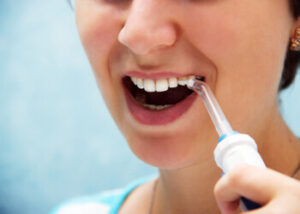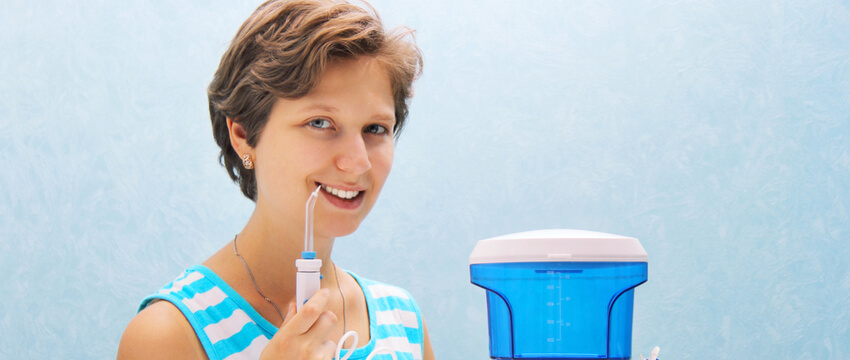We all need to brush and floss twice a day to keep our oral hygiene in check but there are still plenty of people who don’t floss. There are a number of reasons for this, but in reality, dental floss is just not suitable for everyone. The good news is that water flossers offer us a much easier and more comfortable way to keep our teeth cavity-free. Let’s take a look at some of the benefits of water floss vs dental floss.
Why Do We Need To Floss In The First Place?
Your mouth is full of bacteria and every day a sticky film develops over the surface of your teeth. This is called plaque, and the primary objective of brushing and flossing daily is to remove plaque so it doesn’t turn into tartar. Tartar can only be removed by your dentist and a build-up of tartar can lead to dental decay and cavities so it’s important to remove plaque twice a day, as thoroughly as possible.
 Brushing is useful because it allows us to clean the larger surface areas of the teeth and tongue. But your toothbrush can’t get into every space in your mouth. The areas below the gum line and in between each tooth are largely inaccessible by a toothbrush, and that’s why you need to floss.
Brushing is useful because it allows us to clean the larger surface areas of the teeth and tongue. But your toothbrush can’t get into every space in your mouth. The areas below the gum line and in between each tooth are largely inaccessible by a toothbrush, and that’s why you need to floss.
Today we are fortunate enough to have options that make dental care so much easier. String floss isn’t the only way that you can clean between your teeth. Water flossers do the same job but use jets of water to remove plaque. There are a number of benefits to using water floss vs string floss.
Water Floss Vs Dental Floss: What Are The Benefits?
Water Flossers Are Gentle On Your Gums And Soft Tissue
Many users find string floss to be too abrasive on their gums. Seeing a bit of blood in the basin and feeling the discomfort is enough to put a lot of patients off flossing for good. For some people, the reason for this is simply sensitive gums but for others, it could be an early warning sign of gingivitis, an indication that you really do need to improve flossing.
Using a water flosser is a gentle way to keep your gums and teeth clean. Water flossers make use of jets of water to gently clean between the teeth and below the gum line, without sensitivity or bleeding being a problem.
Water Flossers Are Suitable For People Who Have Limited Mobility In Their Hands
Some people suffer from conditions like carpal tunnel syndrome and arthritis, so using string floss can be painful because of problems with the hands. The base of a water flosser is quite big and robust, making it easy to hold. It doesn’t require much dexterity and can be held at the same angle for all the teeth in your mouth.
Water Flossers Are Suitable For Children
Kids need to learn to floss too, but the cost of doing it incorrectly is really high and most parents do not want to take the risk of dental decay while their kids learn about dental hygiene. A water flosser is a great addition to your child’s oral care routine because it takes care of the work, leaving parent and child to relax and get used to the process.
Look After Restorations And Tooth Replacements
If you have lost a tooth to dental decay or have a tooth replacement like a dental implant or bridge, it’s important that you improve your dental hygiene so you can look after it well. Using a water flosser gives you the chance to give each tooth individual attention, and remove all the plaque to maintain a high standard of oral care.
Water Floss Vs Dental Floss For Gum Disease
 Patients who have advanced gum disease really need to ensure their oral hygiene is of a high enough standard. Advanced gum disease or periodontitis is not reversible but you can stop it from getting worse and spreading. When gum disease advances, pockets open up around the teeth, which can hold more bacteria that can destroy the structures that hold your teeth in place.
Patients who have advanced gum disease really need to ensure their oral hygiene is of a high enough standard. Advanced gum disease or periodontitis is not reversible but you can stop it from getting worse and spreading. When gum disease advances, pockets open up around the teeth, which can hold more bacteria that can destroy the structures that hold your teeth in place.
It’s very difficult to keep periodontal pockets clean with a toothbrush and string floss but water flossing can help you to clean out periodontal pockets effectively.
Water Flossers Are Ideal For Patients With Braces
Wearing orthodontic braces creates a barrier between your teeth and your dental hygiene. It’s really difficult to use string floss on teeth with braces, but a water flosser can get through brackets and wires to keep the teeth below clean and cavity-free.
Water Flossers Can Help You Out If You Just Don’t Like String Floss
Some people just don’t like using dental floss and, if you already use an electric toothbrush, a water flosser is a good complement to your oral care routine without too much deviation.
Water Floss Vs Dental Floss: What’s The Drawback?
Water flossing makes light work of keeping your teeth clean but it does come at a cost. While string floss is relatively cheap to buy, investing in a water flosser is more expensive. Of course, you won’t need to replace your water flosser as regularly as dental floss so you will recover the cost in time.
Compared to the cost of dental treatments to restore damaged teeth or replace missing teeth, however, a water flosser is a much more affordable option and certainly worth the investment if long term dental health appeals to you. In dentistry, prevention is always better than cure.
To find out more about the benefits of water floss vs dental floss or to improve your oral care routine, please contact us for your check up appointment: (02) 8806 3799









